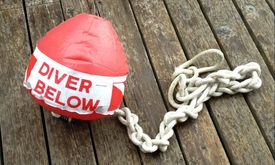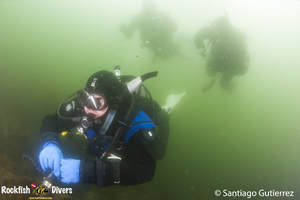 By Stacie Cleveland, PADI Rescue Diver For those of you that have ever been curious about the under water world, scuba diving is an excellent way to immerse yourself in the uncharted territory that the ocean provides. My first experience with diving was life changing, but admittedly, also challenging and a little scary. No one really ever prepares you for how you will react to being under water. Until you try breathing compressed air in full scuba gear below the surface. PADI offers a course that helps prepare you for more than just learning how to dive, it prepares you for the dangers of scuba diving. One of the biggest dangers of the sport is something we are all too familiar with: human error. What causes emergencies anyway? I recently took the PADI Rescue Diver course through Rockfish Divers. It is an amazing course and is of utmost importance if you want to seriously dive recreationally. One of the key points that the course drives home is that most emergencies occur as a result of poor judgement. I cannot agree with this more. I think that most people, when they think of trying scuba diving and think of the things that could go wrong, often come to the conclusion that accidents are the fault of what “lurks below” or things that are out of your control. What most people don’t realize is that most of the time, accidents are usually scenarios that were preventable by the diver. I used to think this way a bit too, prior to taking the course. I always knew the sport came with some risk, but still believed most of what happened when something went wrong was due to unfortunate coincidence. The biggest surprise for me was how many incidents that became emergencies where due to things like improper training, failing to perform all of your pre-dive checks, or being unprepared.  What can I expect from taking this course through Rockfish Divers? The best part of taking the course through Rockfish was how much hands-on training you receive. After learning all the ins and outs of emergency response in diving online, you can’t help but feel a bit nervous for actual water time. I am still fairly new to the sport, only getting back into the water again earlier this year, so most of the time I feel a bit anxious right before a dive. As soon as I am on the boat and going through the pre-dive briefing, I usually start to feel better. That is mainly due to the highly trained, qualified, and amazing staff, and the owners Alisa and Tyler. I had the pleasure of taking my course with Alisa, who guided our group expertly through concepts like self-rescue, search and recovery, and surface drills for how to deal with both conscious and unconscious divers in emergency situations. She makes you feel calm and confident under the water even when you are demonstrating difficult skills, like taking out your own regulator (which is your only source of air), and switching to a spare from another source. Knowing how to do this skill correctly without panicking could mean the difference between life and death, in an emergency scenario. Does this course really change how you dive? Without a doubt, my entire feeling and confidence about diving, and about my own skill level as a diver, has changed after this course. It highlights the importance of situational awareness, not only about yourself and your buddy but also about other divers around you and the environment. I still remember my first few dives, not having a clue what I was doing (let’s be honest, how many of us “fake it” when trying something new for the first time?) even though I read my Open Water manual carefully and studied every page. Even after ten or so dives and my Advance Open Water course, I still did not feel confident with diving. But the beauty and sheer awe of what I have seen under water keeps me coming back. After the Rescue Course, I finally felt for the first time that I had a grasp on what I was doing. I now feel comfortable with many of the aspects of diving that I was fairly clueless about when I started. I understand what I am looking for, and why, when performing my pre-dive safety check, and how certain, seemingly small things can lead to big problems under water if not paid attention to. For example, failing to realize that the buckle doesn’t quite work that snaps in your removable weights in your BCD. This can easily lead to an emergency under water, if you lose that weight without noticing, could send you into an uncontrolled ascent. I also can predict how certain decisions may result in emergency situations. Like not wearing enough insulation on a cold water dive, or deciding to dive when you are tired. These and many other scenarios are things I had very little awareness of when I started. Scuba diving opens your world in ways you cannot explain without experiencing it yourself. Recreational diving is a fun, challenging, and rewarding sport. It can be scary and even cause panic at times, and in rare instances, can result in emergencies. With proper training and preparation, diving becomes seamless and relaxing. I look forward to the day I feel completely confident under the water. Thanks to this course, I am one step closer to that goal. Anyone considering diving, new divers, or those with years of experience, can all benefit from taking this course. And who else better than Rockfish Divers? Thanks to their amazing team, I am a better, safer, and more confident diver. Happy diving! #RockfishDivers #Scuba #ScubaDiving #Rescue #Safety #PADI #Emergencies
1 Comment
|
AuthorRockfish Divers is focused on community and educating divers on safety and environmental issues that impact the aquatic ecosystem. If you have an idea for a topic you would like us to feature, please submit it through the link below and stay tuned. Archives
August 2021
Categories |

 RSS Feed
RSS Feed
